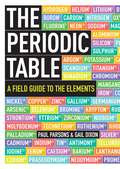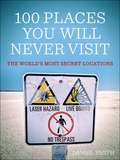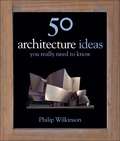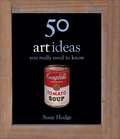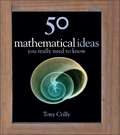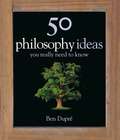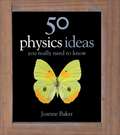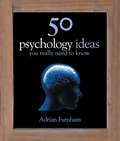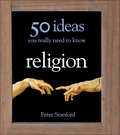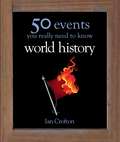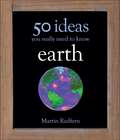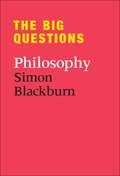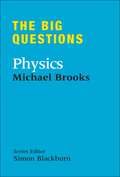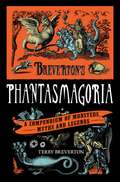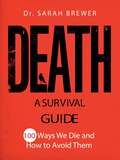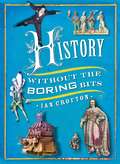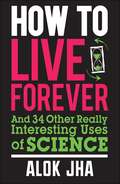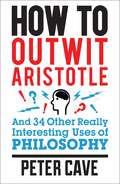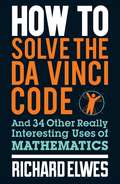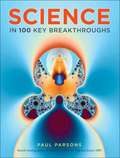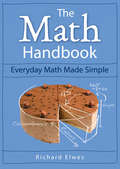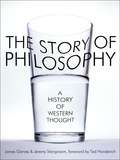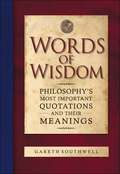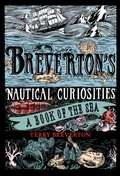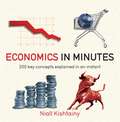- Table View
- List View
The Periodic Table
by Paul ParsonsAs one of the most recognizable images in science, the periodic table is ingrained in our culture. First drawn up in 1869 by Dmitri Mendeleev, its 118 elements make up not only everything on our planet but also everything in the entire universe.The Periodic Table looks at the fascinating story and surprising uses of each of those elements, whether solid, liquid or gas. From the little-known uses of gold in medicine to the development of the hydrogen bomb, each entry is accompanied by technical data (category, atomic number, weight, boiling point) presented in easy-to-read headers, and a colour coding system that helps the reader to navigate through the different groups of elements.A remarkable display of thought-provoking science and beautiful photography, this guide will allow the reader to discover the world afresh.
100 Places You Will Never Visit
by Daniel SmithEver wondered what it takes to get into Fort Knox? Fancied a peek inside the Coca-Cola Safety Deposit Box? Would you dare to visit Three Mile Island? The world is full of secret places that we either don't know about, or couldn't visit even if we wanted to. Now you can glimpse the Tora Bora caves in Afghanistan, visit the Tucson Titan Missile Site, tour the Vatican Archives, or see the Chapel of the Ark. This fascinating guide book takes a look at 100 places around the world that are either so hard to reach, so closely guarded, or so secret that they are virtually impossible to visit any other way.From the Trade Paperback edition.
50 Architecture Ideas You Really Need to Know
by Philip WilkinsonFrom the Pyramids of Giza to the Guggenheim, this lively guide explains the key concepts and inventions in architecture clearly and concisely. Exploring the myriad ways in which the built environment is shaped and created, readers will gain a new and informed appreciation for architecture, from the classical orders of Vitruvius--Doric, Ionic and Corinthian--to the most recent contemporary trends. Philip Wilkinson offers expert introductions to the most important architectural movements and styles throughout history, as well as describing some of the greatest architects' most important and representative works. So, if you've ever wondered when a building is just a building or art, or want to know more about Gothic vaults, trusses and arches, this is the perfect introduction.
50 Art Ideas You Really Need to Know
by Susie HodgeToday's art world can be a baffling place. For all those who don't know their Degas from Dali or Monet from Mondrian, this informative and insightful guide breaks down 50 of the most important and influential trends in western art, to provide a fascinating account of art from the Ancient Greeks to the present day. Taking in the defining artistic moments in history, including the Baroque, the Renaissance and the ever-changing Modern, this book also explores influential movements such as Romanticism, Cubism, and Minimalism. Susie Hodge's concise and insightful text is accompanied by a glossary explaining key terms and concepts, as well as brief mini-essays and informative biographies on artists of the period. With images to illustrate each key concept, and comprehensive timelines to place each movement in its context, this book provides a comprehensive key to the most significant developments in western art.
50 Mathematical Ideas You Really Need to Know
by Tony CrillyJust the mention of mathematics is enough to strike fear into the hearts of many, yet without it, the human race couldn't be where it is today. By exploring the subject through its 50 key insights--from the simple (the number one) and the subtle (the invention of zero) to the sophisticated (proving Fermat's last theorem)--this book shows how mathematics has changed the way we look at the world around us.
50 Philosophy Ideas You Really Need to Know
by Ben DupreHave you ever laid awake at night fretting over how we can be sure of the reality of the external world? Perhaps we are in fact disembodied brains, floating in vats at the whim of some deranged puppet-master? If so, you are not alone--and what's more, you are in exalted company. For this question and other ones like it have been the stuff of philosophical rumination from Plato to Popper.In a series of accessible and engagingly written essays, 50 Philosophy Ideas You Really Need to Know introduces and explains the problems of knowledge, consciousness, identity, ethics, belief, justice and aesthetics that have engaged the attention of thinkers from the era of the ancient Greeks to the present day.
50 Physics Ideas You Really Need to Know
by Joanne BakerIn this, the second volume in an important new series presenting core concepts across a range of critical areas of human knowledge, author Joanne Baker unravels the complexities of 20th-century scientific theory for a general readership. From Hubble's law to the Pauli exclusion principle, and from Schrödinger's cat to Heisenberg's uncertainty principle, she explains ideas at the cutting-edge of scientific enquiry, making them comprehensible and accessible to the layperson.
50 Psychology Ideas You Really Need to Know
by Adrian FurnhamHow different are men and women's brains? Does altruism really exist? Are our minds blank slates at birth? And do dreams reveal our unconscious desires?If you have you ever grappled with these concepts, or tried your hand as an amateur psychologist, 50 Psychology Ideas You Really Need to Know could be just the book for you. Not only providing the answers to these questions and many more, this series of engaging and accessible essays explores each of the central concepts, as well as the arguments of key thinkers. Author Adrian Furnham offers expert and concise introductions to emotional behavior, cognition, mentalconditions--from stress to schizophrenia--rationality and personality development, amongst many others.This is a fascinating introduction to psychology for anyone interested in understanding the human mind.
50 Religion Ideas You Really Need to Know
by Peter StanfordDespite frequent prognostications regarding the "death of God" and the triumph of secular materialism, religion remains a central component in the lives of most people around the world. There are currently thought to be 2 billion Christians, 1.2 billion Muslims, 800 million Hindus, along with some 700 million followers of other religions. Religion: 50 Ideas You Really Need to Know offers a clear path through the conceptual and denominational thickets of global religion. Award-winning religious affairs correspondent Peter Stanford begins with an examination of sacred texts, the divine principle and good and evil, before moving on to a discussion of the different traditions within Christianity, Islam, Judaism and the myriad customs of the East.
World History: 50 Key Milestones You Really Need to Know
by Ian CroftonPeople often complain that in history lessons at school they were taught just a few topics--the Romans, the Tudors, the Nazis--and how they have no idea at all about what happened in between. To remedy this, World History: 50 Things You Really Need to Know offers brief and stimulating outlines of key developments in the history of the world, from the beginning of agriculture 10,000 years ago to the attack on the Twin Towers on 9/11.Each essay is accompanied by a detailed timeline of dates and events, and the flavor of the period concerned is brought to life by selected contemporary quotations from figures as diverse as Aristotle, Ashoka, Saladin, Christopher Columbus, Martin Luther, Suleiman the Magnificent, Galileo, Voltaire, Thomas Jefferson, Mary Wollstonecraft, Napoleon, Lincoln, Lenin and Winston Churchill. In addition, box features throw light on a range of related topics, from the Nazca Lines to Renaissance man, from Confucianism and the state to Alexander the Great's horse, from Islamic science and the Barbary corsairs to the Enigma code and the atomic bomb.
Earth: 50 Ideas You Really Need to Know
by Martin RedfernThis latest book in Quercus's bestselling "50 Ideas" series is a wonderfully accessible overview of the only place we know of in the universe that is capable of sustaining life. Expert popular science writer Martin Redfern covers all the natural processes of the Earth: climate, ocean currents, air currents, the elements, plate tectonics, fossils, the evolution of life, volcanology, sea levels and the ultimate fate of the Earth.
The Big Questions: Philosophy
by Simon BlackburnBestselling author Simon Blackburn tackles the key questions in philosophy--and provides easy-to-understand and enlightening answers.In Big Questions: Philosophy, bestselling author Simon Blackburn addresses the 20 essential questions:What is the meaning of life? Am I free? Why is there something and not nothing? What do we really know? Is there such a thing as society? Can machines think? What is time? How can I deceive myself? Why be good? What fills up space? Can we truly understand each other? Why do things keep on keeping on? Are we rational? What am I? What are my rights? Is truth relative? Do we need God? What is human nature? What is beauty? Is death to be feared?
The Big Questions: Physics
by Michael BrooksThe Big Questions series is designed to let renowned experts address the 20 most fundamental and frequently asked questions of a major branch of science or philosophy. Each 3000-word essay simply and concisely examines a question that has eternally perplexed enquiring minds, and provides answers from history's great thinkers. This ambitious project is a unique distillation of humanity's best ideas. In Big Questions: Physics, Michael Brooks answers the 20 key questions: What is the point of physics? Is everything ultimately random? What is time? Why is there no such thing as a free lunch? What happened to Schrödinger's cat? Can I change the universe with a single glance? Are solids really solid? Which is nature's strongest force? Why does an apple fall? Do we live in a computer simulation? What is light? Is Earth's magnetic shield failing? Am I unique in the universe? Does chaos theory spell disaster? Can we travel through time? Is string theory really about strings? Why does E=mc2? What is the God Particle? Why is there something rather than nothing? What is the ultimate nature of reality?
Breverton's Phantasmagoria
by Terry BrevertonFrom dragons and wyverns to vampires, werewolves and mischievous gremlins, pixies and fairies, Breverton's Phantasmagoria is a unique compendium of over 250 mythical animals.Prepare to revisit familiar myths, such as vampires, werewolves and the Loch Ness Monster, the Minotaur and Medusa from Greek legend, and Biblical beasts such as Behemoth and Leviathan. Discover new mysterious animals like the giant serpents of Central America, the lethal Mongolian death worm, and the Ennedi tiger in Africa, and investigate the evidence for sightings of Bigfoot and the reclusive Yeti. Packed with quirky line illustrations and a wealth of weird and wonderful information, Breverton's Phantasmagoria surveys the globe to uncover over 250 imaginary creatures passed down from generation to generation.
Death: A Survival Guide
by Sarah BrewerWe all have a 100% chance of dying--eventually. But what are the world's biggest killers? When are you most at risk? And what can you do to postpone the inevitable for as long as possible? Death: A Survival Guide offers a unique insight into the biggest threats to life and limb in the industrialized world. Sarah Brewer's comprehensive and thorough survey looks at 100 causes of death from the most common such as heart disease, smoking related deaths and domestic accidents to the unusual and downright bizarre lightning strikes and animal attacks. This fascinating--and occasionally sideways--look at death and dying will help you understand the most common causes of death and how each one affects the human body. "At a glance" statistics reveal who dies where, when and how often; lists of warning signs, symptoms and risk factors allow you to determine the chances of it happening to you; and finally case studies on prevention, treatment and cures describe the best steps you can take to avoid meeting your maker in this way.
History Without the Boring Bits
by Ian CroftonConventional chronologies of world history concentrate on the reigns of kings and queens, the dates of battles and treaties, the publication dates of great books, the completion of famous buildings, the deaths of iconic figures, and the years of major discoveries. But there are other more interesting stories to tell--stories that don't usually get into the history books, but which can nevertheless bring the past vividly and excitingly to life.Imagine a history lesson that spares you the details of such seminal events as the 11th-century papal-imperial conflict, that fails to say much at all about the 1815 Congress of Vienna--and that neglects entirely to mention the world-changing moment that was the 1521 Diet of Worms. Imagine instead a book that tells you the date of the ancient Roman law that made it legal to break wind at banquets; the name of the defunct medieval pope whose putrefying corpse was subjected to the humiliation of a trial before a court of law; the identity of the priapic monarch who sired more bastards than any other king of England; and last but not least the date of the demise in London of the first goat to have circumnavigated the globe twice. Imagine a book crammed with such deliciously disposable information, and you have History without the Boring Bits.By turns bizarre, surprising, trivial, and enlightening, History without the Boring Bits offers rich pickings for the browser, and entertainment and inspiration aplenty for those who have grown weary of more conventional works of history.
How to Live Forever
by Alok JhaHow to Live Forever is the essential survival guide for anyone who has ever been baffled by science. Embarking on a journey from the very small to the very big, readers will be taken on a glorious tour of the universe, taking in cloned sheep, alien worlds, bizarre life forms, quantum weirdness, parallel dimensions and dissected brains along the way.You'll discover how to travel through time, how to start (and cure) a plague, how the mind works, how to turn sunbeams into oak trees, how to boil a planet, how Harry Potter's cloak of invisibility works and much, much more.Both informative and enjoyable, this is a rip-roaring tour through the wonders of the natural world.
How to Outwit Aristotle
by Peter CaveEverything you ever wanted to know about philosophy in 35 bite-size chapters: From the realm of the unconscious to the principles of logic, How to Outwit Aristotle will help you think like a philosopher. Witty and accessible, this is a superb introduction to the subject by one of Britain's most engaging philosophical writers.
How to Solve the Da Vinci Code
by Richard ElwesCan you outrun a bullet? How do you build an electronic brain? Could you slow down time? How do you unleash chaos? From Plato's classification of regular polyhedra to making a million on the stock market, How to Solve the Da Vinci Code gives you everything you need to understand how numbers work, and the impact they have on our lives every day.
Science in 100 Key Breakthroughs
by Paul ParsonsScience in 100 Key Breakthroughs presents a series of clear and concise essays that explain the fundamentals of some of the most exciting and important science concepts you really need to know. Paul Parsons profiles the important, ground-breaking, and front-of-mind scientific discoveries that have had a profound influence on our way of life and will grow in importance with our advancing understanding.In 100 sections, this book provides an overview of the history of Western science, from astronomy and physics to geology, biology and psychology and everything in between. Starting with the origins of counting more than 35,000 years ago, Science tells a rich and fascinating story of discovery, invention, gradual progress and inspired leaps of the imagination. Many key concepts and discoveries are defined and discussed including: The circumference of the Earth, Chaos theory, Algebra, Relativity, Newton's Principia, Brownian motion, Pi, Wave/particle duality, Germ theory, The computer, X-rays, The double helix, Viruses, The human genomeReadable, informative and thought-provoking, this is the ideal introduction to cutting-edge science and the essential overview for anyone who wants to learn more about these often daunting but increasingly essential subjects.
The Math Handbook
by Richard ElwesThis is the perfect introduction for those who have a lingering fear of math. If you think that math is difficult, confusing, dull or just plain scary, then The Math Handbook is your ideal companion. Covering all the basics including fractions, equations, primes, squares and square roots, geometry and fractals, Dr. Richard Elwes will lead you gently towards a greater understanding of this fascinating subject. Even apparently daunting concepts are explained simply, with the assistance of useful diagrams, and with a refreshing lack of jargon.So whether you're an adult or a student, whether you like Sudoku but hate doing sums, or whether you've always been daunted by numbers at work, school or in everyday life, you won't find a better way of overcoming your nervousness about numbers and learning to enjoy making the most of mathematics.
The Story of Philosophy
by Jeremy Stangroom James GarveyThe Story of Philosophy sees philosophy for what it is: a passionate, exhilarating quest for human understanding that cannot be reduced to dry categories or simple definitions. Accessible writing, brilliant scholarship and over 150 colour illustrations combine to form a richly informative and highly entertaining work of narrative history.Packed with intriguing anecdotes and fascinating detail, James Garvey and Jeremy Stangroom bring us face to face with the most important philosophers in western history. The story begins with the Ancient Greeks, Socrates, Plato and Aristotle, great thinkers who set the philosophical agenda to this day. It continues with Greek and Roman philosophers--slaves and emperors who found consolation in deep thoughts about life and death--and moves on to the religious thinkers of the Middle Ages. The origins of modern science, politics, and morality are examined, alongside theories of knowledge, logic, mind and matter. Along the way, you'll discover Descartes' evil demon, Locke on the limits of knowledge, Rousseau and Hobbes on human nature, Hume's scepticism, Kant on duty, Nietzsche's Superman, Marx on class struggle, Russell's logic, Wittgenstein on meaning, Sartre on bad faith, Foucault's take on power, and much more.Rigorous, refreshingly free of academic jargon, and highly accessible, this is the ideal introduction for anyone who wants to gain a new perspective on philosophy's deepest mysteries and most intriguing discoveries.
Words of Wisdom
by Gareth SouthwellWords of Wisdom brings together 360 of philosophy's most famous quotations, explaining their meaning and telling the stories behind them. Western philosophy may be said to have begun in ancient Greece, where, inscribed in his temple at Delphi, the words of the god Apollo commanded those who sought wisdom to first "know thyself." With the author's usual humour and clarity of style, the whole 2,500 year history of philosophy is laid bare. Each quote is set in the context of its cultural background, author biography and general outlook; trends are highlighted, links established, and influences traced, all in a way that is entertaining, thought-provoking, and even fun. Words of Wisdom is the perfect book for those who always wanted to ask what philosophy was about, but were afraid they might not understand the answer.
Breverton's Nautical Curiosities
by Terry BrevertonBreverton's Nautical Curiosities is about ships, people and the sea. However, unlike many other nautical compendiums, the focus of this book is on the unusual, the overlooked or the downright extraordinary. Thus, someone most of us do not know, Admiral William Brown, is given equal coverage to Admiral Nelson. Without Admiral Brown releasing Garibaldi, modern Italy might not exist. And without the barely known genius John Ericsson designing the Monitor, the Confederacy might have won the American Civil War. Readers will be stimulated to read more about the remarkable men--explorers, admirals and trawlermen--who have shaped our world. The sea has had a remarkable effect upon our language. We hear the terms "steer clear", "hit the deck", "don't rock the boat", "to harbor a grudge" and the like, and give little thought to them. In the pages of this book, the reader will find the origin of "bumpkin", a "brace of shakes", "born with a silver spoon", "booby prize", "to take on board", "above board", "bombed" (in the sense of being drunk), the "blues", "blind-side", "blind drunk", "the pot calling the kettle black", "reach the bitter end", "wasters", "ahoy", "all at sea", "to keep aloof", "piss-artist", "taken aback", "barbecue"' and "bamboozle". Other colourful terms, which have passed out of common usage, such as "bring one's arse to anchor" (sit down), "belly timber" (food) and "bog orange" (potato) are also included, as well as important pirate haunts, technical terms, famous battles, maritime inventors and ship speed records.
Economics in Minutes
by Niall KishtainyEconomics in Minutes condenses key economics concepts into 200 short and easily digested essays. Featuring not only fundamental ideas, such as the role of money and how the stock market works, but also subjects that are increasingly important to us today - unemployment, government debt and corporate tax avoidance, for example. Economics in Minutes is the ideal introduction to a complex and vital subject.Key topics are succinctly described and accompanied by illustrations, making them simple to read and easy to remember. This convenient little reference guide will allow readers to understand the theories underpinning a subject that affects our lives on a daily basis.Chapters include: Supply and demand, globalization, market failure, GDP and happiness, risk and uncertainty, living standards and productivity, Game theory, economics and culture.
